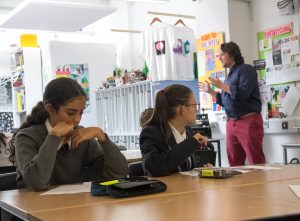You can’t love what you don’t know: reflections on curriculum training
19th October 2020
By Hardip Begol, Non-Executive Director at CfEY and CEO of Woodard Academies Trust
One of the many pleasures of returning to the education sector from my former role within the DfE is seeing how certain issues have progressed. I worked on the curriculum reforms between 2012 and 2014, and I’m heartened to see the increased prominence of curriculum, which should always be the core business of a school.
“If you can’t tell what an excellent curriculum is yourself, how the hell you gonna tell anyone else?” (Thanks, RuPaul).
Earlier this week Christine Counsell led a training session for the senior leadership teams of Woodard schools on their role in developing and delivering an excellent school curriculum. (This follows an excellent webinar last term by CfEY’s Chair Mary Myatt to all Woodard teachers).
It is worth investing time and effort in curriculum because it is a school’s mechanism for developing children’s knowledge and experience of how the world works; their views, values and attitudes about themselves, others and society; and their spiritual, moral and cultural understanding.
 During our training, Counsell focussed on the relationship between background knowledge and reading comprehension. She drew on evidence regarding prototype theory – that is, the extent to which certain language better represents certain concepts (Rosch) – and Schema Theory, which highlights the relationship between background knowledge and reading comprehension (Anderson). Importantly, one’s existing knowledge affects the acquisition of new knowledge, and children with a broad range of examples in their memories have faster and more flexible comprehension and are less likely to be overwhelmed by new information. Therefore, how difficult new content is depends on what you’ve learnt before. But Schema Theory goes further: as a mental structure of an idea or a word, our existing schema influences how we perceive new information and experiences and what we notice about it. This matters for teachers, because it affects whether pupils find new content interesting, profound, or emotionally moving.
During our training, Counsell focussed on the relationship between background knowledge and reading comprehension. She drew on evidence regarding prototype theory – that is, the extent to which certain language better represents certain concepts (Rosch) – and Schema Theory, which highlights the relationship between background knowledge and reading comprehension (Anderson). Importantly, one’s existing knowledge affects the acquisition of new knowledge, and children with a broad range of examples in their memories have faster and more flexible comprehension and are less likely to be overwhelmed by new information. Therefore, how difficult new content is depends on what you’ve learnt before. But Schema Theory goes further: as a mental structure of an idea or a word, our existing schema influences how we perceive new information and experiences and what we notice about it. This matters for teachers, because it affects whether pupils find new content interesting, profound, or emotionally moving.
This won’t be news to most people. We’ve known for decades that, on average, a child’s prior attainment is the best predictor for future achievement. And in England there is too strong a link between socio-economic background and attainment.
And this doesn’t just happen at school. In the workplace, people with a degree are more likely to participate in job-related training compared to those with no qualifications. This is the Matthew effect in practice.
We’ve known for decades that, on average, a child’s prior attainment is the best predictor for future achievement. Yet we see the Matthew effect exert its influence in the workplace, too. @HardipBegol's new blog for @TheCFEY Share on XThe science of learning tells us that what struggling pupils need is more knowledge. ASCL’s Forgotten Third report says on improving reading:
“The two obvious solutions lie in the explicit teaching of vocabulary through a well-planned and delivered curriculum – both subject-specific key words and academic vocabulary – and promoting more independent reading, which has been proven to broaden vocabulary. … All of this must be underpinned by high-quality oracy,”
The school curriculum should fill the gaps in knowledge to enable all pupils to perceive and notice what is intended. More time to access this entitlement rather than less. More practise and explanation. More opportunities to gain sufficient understanding so they may experience the joy in a subject that their teacher has and models in their teaching. Otherwise we will see the gap fail to close.

CfEY’s forthcoming report with OUP on bridging the word gap at transition drills down into the role of vocabulary within the curriculum in supporting young people’s academic, social and emotional development, and you can sign up for the launch, here.


Comments